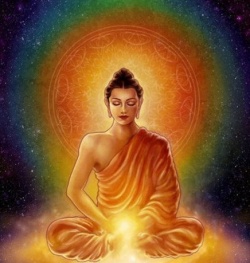Difference between revisions of "Shunyatavada"
| (3 intermediate revisions by the same user not shown) | |||
| Line 3: | Line 3: | ||
[[Madhyamika Shurangama-sutra]] ([[Suramgama-sutra]]), Skt. | [[Madhyamika Shurangama-sutra]] ([[Suramgama-sutra]]), Skt. | ||
| − | (Jap.,[[ Rydgen-kyd]]); the “[[Sutra | + | (Jap.,[[ Rydgen-kyd]]); the “[[Sutra of the Heroic One]]," which is only extant in {{Wiki|Chinese}} translation, exercised a great [[influence]] on the [[development]] of [[Mahayana Buddhism]] in {{Wiki|China}}. It emphasizes the [[power]] of - [[samadhi]], through which [[enlightenment]] can be [[attained]], and explains the various methods of [[emptiness]] [[meditation]] ( [[shunyata]]), through the [[practice]] of which everyone, whether [[monk]] or {{Wiki|layperson}}, can realize the [[enlightenment]] of a - [[bodhisattva]]. The [[sutra]] is particularly popular in [[Zen]]. |
| − | [[Shushna]] ([[Susna]]), Skt.; falsehood, [[deceit]]; forces that lead to [[suffering]]; they arise from [[impure]] {{Wiki|thoughts}} and {{Wiki|ego}}-directed impulses, and act as an impediment to {{Wiki|knowledge}}. | + | [[Shushna]] ([[Susna]]), Skt.; falsehood, [[deceit]]; forces that lead to [[suffering]]; they arise from [[impure]] {{Wiki|thoughts}} and {{Wiki|ego}}-directed [[impulses]], and act as an impediment to {{Wiki|knowledge}}. |
In the {{Wiki|Rigveda}}, [[Shushna]] is a {{Wiki|demon}} ({{Wiki|symbolic}} of the forces opposing [[knowledge]]) who is slain by the [[god]] {{Wiki|Indra}}, [[lord]] of the {{Wiki|sense}} ( {{Wiki|indriya}}). In other words, through control of the [[senses]] the forces that stand opposed to [[knowledge]] can all be overcome. | In the {{Wiki|Rigveda}}, [[Shushna]] is a {{Wiki|demon}} ({{Wiki|symbolic}} of the forces opposing [[knowledge]]) who is slain by the [[god]] {{Wiki|Indra}}, [[lord]] of the {{Wiki|sense}} ( {{Wiki|indriya}}). In other words, through control of the [[senses]] the forces that stand opposed to [[knowledge]] can all be overcome. | ||
Latest revision as of 20:57, 17 March 2015
Madhyamika Shurangama-sutra (Suramgama-sutra), Skt.
(Jap.,Rydgen-kyd); the “Sutra of the Heroic One," which is only extant in Chinese translation, exercised a great influence on the development of Mahayana Buddhism in China. It emphasizes the power of - samadhi, through which enlightenment can be attained, and explains the various methods of emptiness meditation ( shunyata), through the practice of which everyone, whether monk or layperson, can realize the enlightenment of a - bodhisattva. The sutra is particularly popular in Zen.
Shushna (Susna), Skt.; falsehood, deceit; forces that lead to suffering; they arise from impure thoughts and ego-directed impulses, and act as an impediment to knowledge.
In the Rigveda, Shushna is a demon (symbolic of the forces opposing knowledge) who is slain by the god Indra, lord of the sense ( indriya). In other words, through control of the senses the forces that stand opposed to knowledge can all be overcome.
